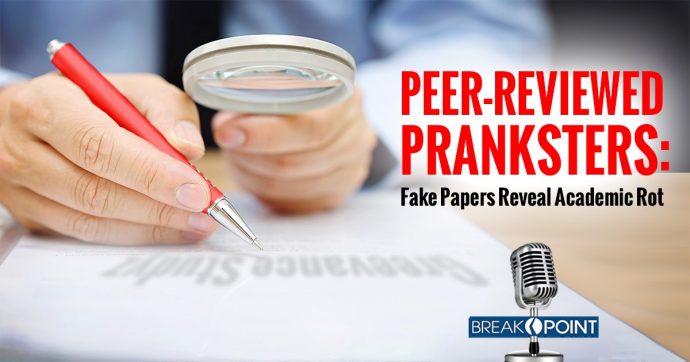This is too funny — and sad at the same time — here are John Stonestreet and G. Shane Morris writing at Breakpoint about peer-reviewed pranksters:
The joke was played on academic journals, but the politically-correct corruption of higher learning is no laughing matter.
Twenty years ago, mathematician Alan Sokal set out to prove that postmodernism in academia was “fashionable nonsense.” So, he wrote a gibberish paper combining post-structuralist lingo with physics terms, and submitted it to the journal, “Social Text.” Not only was his deliberate drivel accepted, but over 1,500 papers have cited it as source material.
Fast-forward to 2018: Three others professors decided to see if they could get past the peer-review process and reveal that fashionable nonsense lives on. Professors James Lindsay, Helen Pluckrose, and Peter Boghossian—all professed liberals—wrote and submitted baloney research to academic journals specializing in a brand of social activism these highly-credentialed pranksters call “grievance studies.”
Their mission? To demonstrate how simple it is to get “absurdities and morally fashionable political ideas published as legitimate academic research.” Or to put it more simply, they wanted to show that journals with itching ears will accept any work—no matter how ridiculous—as long as it validates trendy ideas about race, sex, and oppression.
These renegade scholars were rewarded spectacularly for their efforts. One gender studies journal accepted and published a paper that paraphrased a 3,000-word section of Adolf Hitler’s “Mein Kampf,” using feminist terminology.
Another published a mock paper arguing that dog parks are “rape-condoning spaces”…for reasons I’ll leave you to figure out. Reviewers at the same journal requested only a slight rewrite of another paper proposing that so-called “privileged students” shouldn’t be allowed to speak in class. Instead, suggested the authors, such students should learn in silence, and even pay “experiential reparations” by “sitting on the floor, wearing chains.”
Incredibly, the reviewers thought that the fake proposals were too soft on privileged students.
Read more: Breakpoint

